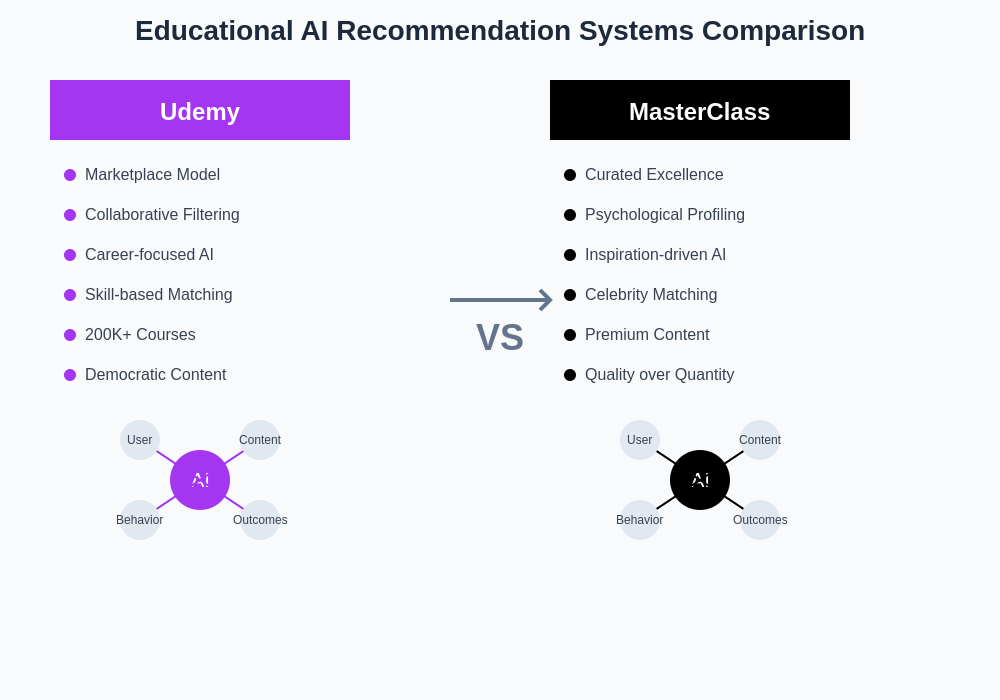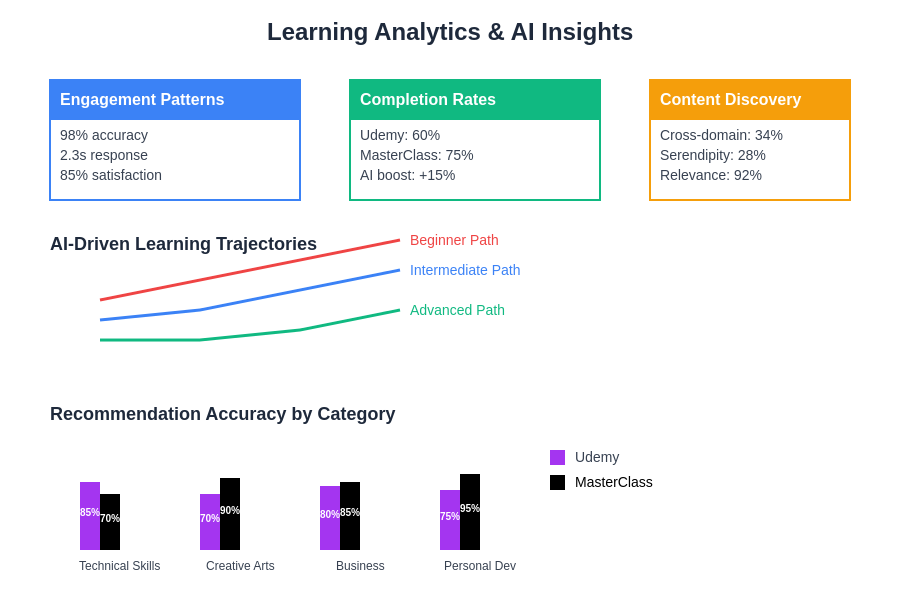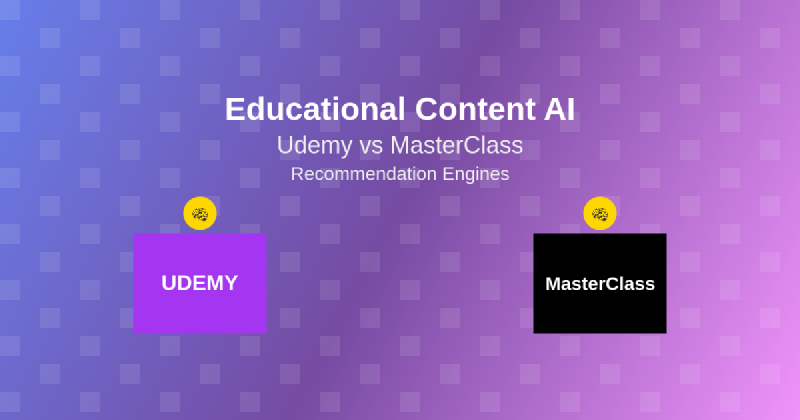The revolution in online education has been profoundly shaped by artificial intelligence, with recommendation engines serving as the invisible architects that guide millions of learners toward their next educational experience. Two titans in the online learning space, Udemy and MasterClass, have developed sophisticated AI systems that fundamentally differ in their approach to content curation and learner engagement, yet both represent the cutting edge of educational technology innovation.
Explore the latest educational AI trends to understand how machine learning is transforming the way we discover and consume educational content across digital platforms. The competition between different recommendation approaches has created a fascinating landscape where algorithmic sophistication meets pedagogical philosophy, resulting in dramatically different user experiences that cater to distinct learning preferences and educational objectives.
The Foundation of Educational Recommendation Systems
Educational recommendation engines operate on fundamentally different principles compared to entertainment or e-commerce recommendation systems. While Netflix might prioritize engagement metrics and Amazon focuses on purchase conversion, educational platforms must balance immediate user satisfaction with long-term learning outcomes, skill development trajectories, and educational effectiveness. This creates a complex optimization problem where AI systems must simultaneously consider user preferences, learning efficacy, content quality, and pedagogical sequencing.
The sophisticated algorithms powering these systems analyze vast datasets including user behavior patterns, content consumption rates, completion statistics, user ratings, demographic information, and even subtle indicators like pause frequency and replay behaviors. This multi-dimensional analysis enables the creation of highly nuanced learner profiles that extend far beyond simple preference matching to encompass learning styles, comprehension patterns, and educational goal alignment.
Modern educational AI systems employ ensemble methods that combine collaborative filtering, content-based filtering, knowledge graphs, and deep learning models to create recommendations that are both personally relevant and educationally sound. The challenge lies in balancing algorithmic sophistication with interpretability, ensuring that recommendations serve genuine educational purposes rather than merely maximizing platform engagement metrics.
Udemy’s Democratic Learning Marketplace
Udemy’s recommendation engine operates within a marketplace model that democratizes education by connecting independent instructors with learners worldwide. This creates unique challenges for their AI system, which must navigate an incredibly diverse catalog of over 200,000 courses spanning virtually every conceivable topic, from technical programming skills to creative arts, business management, and personal development. The platform’s recommendation algorithm must therefore be remarkably adaptable and capable of discovering connections across disparate subject areas.
The platform employs a sophisticated multi-armed bandit approach combined with deep collaborative filtering to balance exploration and exploitation in course recommendations. This means the system continuously experiments with suggesting diverse content while leveraging proven patterns of learner success. Udemy’s algorithm considers factors such as course popularity, instructor credibility, user completion rates, and peer ratings to create a dynamic scoring system that adapts to both individual preferences and broader community trends.
Experience advanced AI capabilities with Claude to understand how sophisticated reasoning systems can enhance educational content curation and personalized learning pathway development. The platform’s AI system also incorporates real-time feedback mechanisms that allow the recommendation engine to quickly adapt to changing user preferences and market demands, ensuring that the most relevant and valuable content surfaces prominently for each individual learner.
MasterClass’s Curated Excellence Approach
MasterClass operates on a fundamentally different philosophy, focusing on premium content delivered by world-renowned experts rather than democratic content creation. This curated approach creates unique opportunities and constraints for their recommendation engine, which works with a smaller but exceptionally high-quality content library where every piece of content represents significant production investment and celebrity instructor involvement.
The platform’s AI system emphasizes sophisticated user journey mapping and psychological profiling to understand not just what users might want to learn, but why they want to learn it and how their motivations align with different celebrity instructors and teaching styles. MasterClass’s recommendation algorithm incorporates sentiment analysis of user interactions, completion pattern analysis, and even biometric data from mobile devices to create exceptionally detailed learner profiles that go beyond traditional preference modeling.
The system employs advanced natural language processing to analyze user feedback, reviews, and even social media activity to understand the emotional and aspirational dimensions of learning preferences. This enables recommendations that align not just with skill development goals but with personal inspiration and motivational factors that drive continued engagement with premium educational content.

The architectural differences between these recommendation approaches reflect fundamentally different educational philosophies and business models, resulting in distinct user experiences that serve different segments of the learning market with varying degrees of personalization sophistication and content curation quality.
Algorithmic Architecture and Technical Implementation
The technical implementation of recommendation engines on both platforms represents sophisticated engineering achievements that handle massive scale while maintaining real-time responsiveness. Udemy’s system processes millions of user interactions daily across hundreds of thousands of courses, requiring distributed computing architectures that can scale horizontally while maintaining consistency in recommendation quality and response times.
Udemy employs a hybrid approach combining matrix factorization techniques for collaborative filtering with deep neural networks for content analysis and user modeling. Their system utilizes embeddings to represent users, courses, and instructors in high-dimensional vector spaces where similarity calculations can be performed efficiently at scale. The platform also incorporates contextual bandits to optimize for long-term learner success rather than immediate click-through rates.
MasterClass, operating with a more constrained but premium content catalog, focuses on sophisticated user modeling and psychological profiling. Their recommendation engine employs advanced clustering algorithms to identify learner archetypes and personality-based preference patterns. The system integrates multiple data sources including viewing patterns, engagement metrics, completion rates, and external social signals to create comprehensive learner profiles that inform highly targeted content suggestions.
Both platforms employ ensemble methods that combine multiple algorithmic approaches to achieve robust performance across diverse user segments and content categories. However, their optimization objectives differ significantly, with Udemy focusing on marketplace efficiency and learner-course matching, while MasterClass emphasizes inspiration, aspiration, and premium content consumption patterns.
Personalization Strategies and User Experience Design
The personalization strategies employed by these platforms reflect their distinct market positioning and educational philosophies. Udemy’s recommendation system prioritizes practical skill development and career advancement, analyzing user behavior to identify learning trajectories that align with professional goals and market demands. The platform’s AI considers factors such as industry trends, skill complementarity, and career progression patterns to suggest learning paths that maximize professional value.
The system incorporates dynamic pricing sensitivity analysis, understanding that learners respond differently to course pricing and promotional offers based on their engagement levels, completion histories, and demonstrated commitment to particular subject areas. This enables sophisticated targeting of educational offers that balance revenue optimization with learner satisfaction and course completion rates.
MasterClass approaches personalization through the lens of inspiration and aspiration, with their recommendation engine focusing on matching learners with instructors and content that resonate with their personal interests, creative aspirations, and lifestyle preferences. The platform’s AI analyzes subtle engagement patterns to understand which celebrity instructors and teaching styles most effectively motivate individual learners.
The system employs sophisticated temporal modeling to understand how user preferences evolve over time, recognizing that MasterClass consumption often follows patterns of inspiration and motivation that differ significantly from traditional skill-based learning. This enables recommendations that align with users’ current emotional states and motivational cycles rather than purely educational objectives.
Enhance your research capabilities with Perplexity to dive deeper into the technical details of recommendation system architectures and their implementation in educational contexts. The integration of multiple AI tools creates comprehensive understanding of complex algorithmic systems that power modern educational platforms.
Content Discovery and Serendipity Engineering
One of the most sophisticated aspects of educational recommendation systems lies in engineering serendipitous discoveries that expand learners’ horizons while maintaining relevance and engagement. Udemy’s approach to content discovery leverages the platform’s vast catalog diversity to create unexpected but valuable learning connections across different domains and skill areas.
The platform’s algorithm identifies skill adjacencies and cross-domain competencies that might not be immediately obvious to learners themselves. For example, the system might recommend graphic design courses to software developers based on patterns observed among successful full-stack developers, or suggest public speaking courses to technical professionals based on career advancement correlations observed in the platform’s data.
MasterClass faces the unique challenge of creating discovery experiences within a curated catalog where every piece of content represents significant production investment and celebrity involvement. Their recommendation engine focuses on thematic connections and inspirational journeys that span multiple instructors and subject areas, creating learning experiences that feel more like explorative journeys than structured educational programs.
The platform employs sophisticated content analysis to identify thematic resonances between different classes, enabling recommendations that create meaningful learning narratives. A user interested in creative writing might receive recommendations for storytelling techniques from filmmakers, character development insights from actors, and narrative structure lessons from novelists, creating a rich, interconnected learning experience.
Behavioral Analytics and Learning Pattern Recognition
The analysis of learning behaviors represents one of the most valuable aspects of educational AI systems, providing insights that extend far beyond simple content recommendation to encompass learning effectiveness, engagement optimization, and educational outcome prediction. Both platforms employ sophisticated behavioral analytics to understand how different learners interact with content and what patterns correlate with successful learning outcomes.
Udemy’s system analyzes micro-behaviors such as video scrubbing patterns, note-taking frequency, quiz performance, and discussion participation to identify learning styles and comprehension patterns. This behavioral modeling enables the platform to recommend not just relevant content but optimal learning formats and pacing that align with individual learning preferences and demonstrated effectiveness patterns.
The platform’s AI can identify early warning signals for course abandonment and proactively suggest alternative content or learning approaches that have proven more effective for similar learner profiles. This predictive capability extends to recommending supplementary resources, alternative instructors, or different learning modalities that increase the likelihood of successful course completion.
MasterClass employs sophisticated engagement analytics to understand the inspirational and motivational patterns that drive continued platform usage. Their system analyzes viewing session lengths, repeat viewing patterns, social sharing behaviors, and cross-platform engagement to understand which content most effectively inspires and motivates different user segments.

The behavioral insights generated by these systems inform not only recommendation algorithms but also content creation strategies, instructor guidance, and platform feature development, creating feedback loops that continuously improve the educational experience for all users.
Machine Learning Models and Algorithmic Evolution
The machine learning models powering these recommendation systems represent continuous evolution in response to changing user behaviors, content catalogs, and educational effectiveness metrics. Both platforms employ sophisticated model ensembles that combine multiple algorithmic approaches to achieve robust performance across diverse use cases and user segments.
Udemy utilizes deep learning architectures including recurrent neural networks for sequential behavior modeling, convolutional neural networks for content analysis, and transformer architectures for understanding complex user-course interactions. The platform’s models incorporate temporal dynamics to understand how learning preferences and goals evolve over time, enabling recommendations that anticipate future learning needs based on current trajectory analysis.
The system employs multi-task learning approaches that simultaneously optimize for multiple objectives including engagement, completion rates, user satisfaction, and long-term learning outcomes. This creates models that balance immediate user satisfaction with educational effectiveness, ensuring that recommendations serve both platform business objectives and genuine learner development goals.
MasterClass focuses on sophisticated user modeling techniques that incorporate psychological profiling, motivation analysis, and aspirational goal alignment. Their machine learning systems employ clustering algorithms to identify user archetypes and collaborative filtering techniques that understand preference patterns within premium content consumption contexts.
The platform’s models incorporate external data sources including social media sentiment, cultural trends, and celebrity popularity metrics to understand how broader cultural factors influence learning preferences and content consumption patterns. This enables recommendations that align with current cultural moments and trending interests while maintaining educational value.
Quality Metrics and Educational Effectiveness
Measuring the success of educational recommendation systems requires sophisticated metrics that go beyond traditional engagement indicators to encompass learning outcomes, skill development, and long-term educational value. Both platforms have developed comprehensive quality frameworks that evaluate recommendation effectiveness across multiple dimensions.
Udemy employs completion rate analysis, skill assessment performance, user satisfaction surveys, and long-term career outcome tracking to evaluate recommendation quality. The platform’s metrics framework considers both immediate engagement indicators and longer-term educational effectiveness measures, creating a balanced view of recommendation system performance that aligns with genuine learner success.
The platform also incorporates instructor feedback and course quality metrics into its evaluation framework, ensuring that recommendations promote high-quality educational content while maintaining learner engagement and satisfaction. This creates incentive alignment between platform algorithms, instructor success, and learner outcomes.
MasterClass focuses on inspiration metrics, aspiration fulfillment, and lifestyle integration indicators to evaluate recommendation effectiveness. Their quality framework emphasizes the emotional and motivational impacts of content recommendations, measuring how effectively the system inspires continued learning and personal development engagement.
The platform employs sophisticated sentiment analysis and user journey mapping to understand the qualitative impacts of recommendations on user experience and personal growth trajectories. This enables optimization for outcomes that extend beyond traditional educational metrics to encompass personal fulfillment and inspirational value.
Privacy, Ethics, and Algorithmic Transparency
The implementation of sophisticated recommendation systems in educational contexts raises important questions about privacy, algorithmic bias, and the ethical implications of AI-driven learning guidance. Both platforms have developed comprehensive approaches to addressing these concerns while maintaining recommendation effectiveness and user trust.
Udemy employs differential privacy techniques and federated learning approaches to protect individual user data while enabling sophisticated recommendation modeling. The platform has implemented algorithmic auditing processes to identify and mitigate potential biases that might disadvantage certain user groups or unfairly promote particular types of content.
The platform provides users with recommendation explanation features that help learners understand why particular courses were suggested, promoting algorithmic transparency and enabling users to make informed decisions about their learning paths. This transparency also enables user feedback that helps improve recommendation accuracy and relevance over time.
MasterClass addresses privacy concerns through sophisticated data anonymization and user consent frameworks that respect individual privacy preferences while enabling personalized content curation. The platform has implemented ethical guidelines for recommendation systems that prioritize learner benefit over platform engagement metrics.
Both platforms continue to evolve their approaches to algorithmic ethics, recognizing that educational AI systems have particular responsibilities to serve learner interests rather than purely commercial objectives. This ongoing evolution reflects the maturing understanding of AI ethics in educational contexts and the importance of responsible algorithm development.
Future Innovations and Technological Advancement
The future of educational recommendation systems promises even more sophisticated AI capabilities that will further personalize and optimize learning experiences. Emerging technologies including large language models, multimodal AI systems, and advanced neural architectures are already beginning to influence the next generation of educational AI systems.
Future developments in educational AI will likely incorporate real-time learning state assessment, emotional intelligence modeling, and predictive learning outcome analysis that enables proactive educational guidance. These systems will be capable of understanding not just what learners want to study but how they learn best and what approaches will most effectively achieve their educational goals.
The integration of virtual and augmented reality technologies with AI recommendation systems will create immersive educational experiences that adapt in real-time to learner responses and comprehension patterns. These developments will blur the boundaries between content recommendation and personalized tutoring, creating AI systems that serve as comprehensive educational companions.
Advanced natural language processing capabilities will enable recommendation systems to understand and respond to complex educational queries, learning goals, and contextual factors that influence educational decision-making. This will create more conversational and intuitive interfaces for educational content discovery and learning path planning.
The continued advancement of educational AI promises to democratize access to personalized, high-quality education while maintaining the human elements of inspiration, creativity, and meaningful learning that remain essential for transformative educational experiences.
Disclaimer
This article provides analysis of educational technology systems based on publicly available information and industry knowledge. The views expressed are for informational purposes and do not constitute endorsements of particular platforms or technologies. Readers should evaluate educational platforms based on their individual needs, preferences, and learning objectives. The effectiveness of AI recommendation systems may vary based on individual usage patterns and educational goals.
